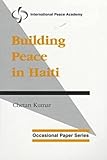Building Peace in Haiti / Chetan Kumar.
Material type: TextSeries: A project of the International Peace InstitutePublisher: Boulder : Lynne Rienner Publishers, [2023]Copyright date: ©1998Description: 1 online resource (107 p.)Content type:
TextSeries: A project of the International Peace InstitutePublisher: Boulder : Lynne Rienner Publishers, [2023]Copyright date: ©1998Description: 1 online resource (107 p.)Content type: - 9781555877705
- 9781685851781
- online - DeGruyter
| Item type | Current library | Call number | URL | Status | Notes | Barcode | |
|---|---|---|---|---|---|---|---|
 eBook
eBook
|
Biblioteca "Angelicum" Pont. Univ. S.Tommaso d'Aquino Nuvola online | online - DeGruyter (Browse shelf(Opens below)) | Online access | Not for loan (Accesso limitato) | Accesso per gli utenti autorizzati / Access for authorized users | (dgr)9781685851781 |
Browsing Biblioteca "Angelicum" Pont. Univ. S.Tommaso d'Aquino shelves, Shelving location: Nuvola online Close shelf browser (Hides shelf browser)

|

|

|

|

|

|

|
||
| online - DeGruyter Ethnopolitics in the New Europe / | online - DeGruyter Conversations with Carter / | online - DeGruyter The U.S. and the Two Koreas : A New Triangle / | online - DeGruyter Building Peace in Haiti / | online - DeGruyter Corporations vs. The Court : Private Power, Public Interests / | online - DeGruyter The Mark of the Bundesbank : Germany's Role in European Monetary Cooperation / | online - DeGruyter State, Conflict, and Democracy in Africa / |
Frontmatter -- CONTENTS -- ACKNOWLEDGMENTS -- ACRONYMS AND ABBREVIATIONS -- Map of Haiti -- CHRONOLOGY OF KEY DEVELOPMENTS -- 1 INTRODUCTION -- 2 THE UN AND HAITI TODAY -- 3 HAITI SINCE INDEPENDENCE -- 4 UNDERDEVELOPMENT IN HAITI -- 5 HAITI AFTER THE DUVALIERS -- 6 RECOMMENDATIONS FOR PEACEBUILDING -- NOTES -- BIBLIOGRAPHY -- ABOUT THIS OCCASIONAL PAPER -- THE INTERNATIONAL PEACE ACADEMY -- OTHER INTERNATIONAL PEACE ACADEMY PUBLICATIONS
restricted access online access with authorization star
http://purl.org/coar/access_right/c_16ec
Though its national life often has been characterized by violence, Haiti has not been victim of a full-fledged internal conflict, or civil war. Why, then, is the international community conducting "postconflict peacebuilding" operations there? Addressing that question, Chetan Kumar examines the course of international involvement in Haiti through the prism of the country's unique past and present. His narrative is grounded in a discussion of the nature of peacebuilding and the role of civil society in building a functioning state. A basket of nonmilitary activities designed to address some of the primary causes of violence—weak institutions, underdevelopment, poverty—have come to be referred to as postconflict peacebuilding in the Haitian context. How do these activities differ from the numerous development schemes launched from the mid-1960s onward? Is peacebuilding essentially about successful development? Kumar engages the recent heated debate about these issues. Haitians have struggled among themselves to define the nature, structure, and power base of a state that can best provide for its constituents—and their conception frequently is at odds with the one promoted by the international community. Building a lasting peace, Kumar emphasizes, will be possible only if Haitians themselves support any given understanding of what a successful polity and economy should look like, and if they participate in bringing it about. He concludes with recommendations aimed at encouraging that participation.
Mode of access: Internet via World Wide Web.
In English.
Description based on online resource; title from PDF title page (publisher's Web site, viewed 06. Mrz 2024)


